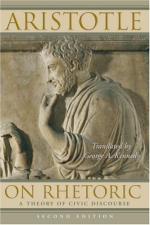
|
| Name: _________________________ | Period: ___________________ |
This quiz consists of 5 multiple choice and 5 short answer questions through Book II, Chapters 23-26.
Multiple Choice Questions
1. Besides proof with explicit premises, what was included in Aristotle's definition of syllogism?
(a) A conclusion.
(b) Multiple examples.
(c) An introduction.
(d) An example.
2. According to Aristotle, what was the general difference between enthymemes and examples?
(a) Examples were more persuasive than enthymemes.
(b) Both enthymemes and examples were just as persuasive.
(c) Enthymemes were more persuasive than examples.
(d) Neither enthymemes nor examples were persuasive.
3. Which of the following were examples of the involuntary causes for human action that Aristotle outlined?
(a) Luck, nature, habit, and compulsion.
(b) Luck, nature, and compulsion.
(c) Luck, habit, and compulsion.
(d) Luck, nature, and habit.
4. According to Aristotle, how could a person defend their position in the future when they discovered the truth of a question?
(a) More precisely.
(b) More forcefully.
(c) Less forcefully.
(d) Less precisely.
5. Focusing on what they found useful, what did Aristotle say older people cared less about?
(a) Honor and the opinions of others.
(b) Honor and the past.
(c) Honor, the past, and the opinions of others.
(d) The past and the opinions of others.
Short Answer Questions
1. In Aristotle's opinion, what should a good birth lead to?
2. Who did Aristotle think must obey the general law?
3. Which one of the following would be an example of a fallacious enthymeme?
4. Concerning the elicitation of the praise or blame of an audience, what was epideictic rhetoric also called by Aristotle?
5. As discussed by Aristotle, how many modes of persuasion did rhetoric use?
|
This section contains 287 words (approx. 1 page at 300 words per page) |

|




